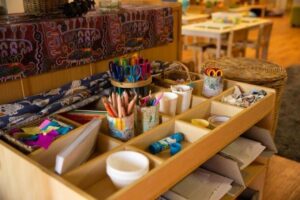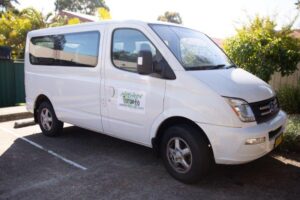Our School Readiness/Transition to school program focuses on supporting children to become cooperative learners ready to take the next step in the educational life. Our program achieves this through:
Language and Literacy
 • By encouraging the children to write and draw daily. Starting with familiar words such as their name and the names of their friends. This expands to using language when creating bike licences, menus in play restaurants, money for shops, telling stories about their drawing etc.
• By encouraging the children to write and draw daily. Starting with familiar words such as their name and the names of their friends. This expands to using language when creating bike licences, menus in play restaurants, money for shops, telling stories about their drawing etc.
• Through story- telling and reading to children, Educators teach children to understand and identify that print has meaning and to differentiate between text and images.
• News or Show and tell time allows the child to develop their confidence in public speaking, sharing their thoughts and feelings and to listen to others and ask questions in relation to the subject.
Maths
• Educators use numbers in songs and stories as well as play experiences. This helps children understand number order as well as recognize numerals.
• We will expand upon their mathematical terminology and to recognise how to use them appropriately i.e.: bigger, smaller, taller, above, below, identify shapes.
Physical Development
• We will enhance your child’s physical development, that is muscle development and coordination, through activities that will involve drawing, painting and manipulating a variety of materials such as small lego, pencils, threading, clay and play dough.
• Gross motor development is promoted through activities such as running, jumping, hopping, climbing, balancing, dance, music and movement, ball games, digging, fundamental movement activities and sitting tall during group time which will strengthen their upper and lower body.
• Learning to independently dress and undress oneself is an important skill as is recognising when they are thirsty and obtaining a drink.
Cognitive and Thinking
• We will give children the opportunity to explore how and why things work.
• Working with others and individually to solve problems.
• Allowing them the opportunity to select a task and encouraging them to follow it through to the end.
• We encourage children to take safe risks through trial and error as they attempt to solve problems.
Social and Emotional
• Our program supports the children’s development of self-regulation, turn taking and negotiation.
• Children also learn conflict resolution and how to respect other people’s ideas.
• Our transition to school program also includes:
• Visits to local schools and visits from teachers from local schools.
• Practice unwrapping lunch items.
• Developing relationships with others going to the same school.
• Visits from previous children who now attend school to talk about their experiences.
• Discussions about orientations, buddy system, playgrounds etc.
• Cognitive games in small groups to extend concentration skills.
• Longer group times towards the end of the year.